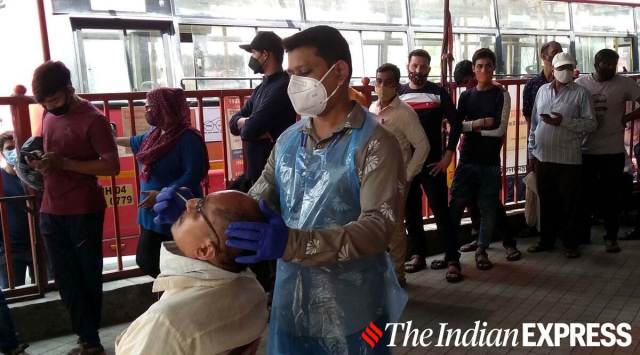- India
- International
Why there is no need to repeat RT-PCR test after 14 days of quarantine
Even after the virus is dead and ineffective in the body, some may experience its after-effects. But that does not mean these people can transmit the virus, a doctor says
 Noting that these communities are vulnerable to being severely affected by the COVID-19 virus, the activists, through a letter, have urged Patnaik to take adequate measures for the welfare of the community members.(Express photo by Deepak Joshi)
Noting that these communities are vulnerable to being severely affected by the COVID-19 virus, the activists, through a letter, have urged Patnaik to take adequate measures for the welfare of the community members.(Express photo by Deepak Joshi)As people grapple with the second wave of the Covid infection, they are left with many questions that they often do not find satisfactory answers for. One of them has to do with Covid tests and the RT-PCR results, which then define the next course of action, possible medication and how the patient can get on the road to recovery, among other things.
What has been happening is that because of the increase in demand, the RT-PCR results have been taking longer time to process, leaving the patient waiting for confirmation, and for the COVID-19 medication to start. It has also been impacting those in isolation to get back to normal life.
Dr Sandeep Patil, chief intensivist, Fortis Hospital, Kalyan explains that many COVID-19 experts have now started to suggest after 14 days of quarantine, people with mild to moderate infection may not need to get re-tested to ensure a negative report.
Why is that?
“Most people argue ever since the pandemic started, patients with COVID-19 were not discharged until their chest radiograph had cleared, and they had two consecutive negative test results on RT-PCR. That was true until last year, when the virus was new and our epidemiologists were still understanding its effect on humans.

“Although the virus has mutated, its infectiousness has now been well established. The Ministry of Health and Family Welfare, therefore, has come up with a new criteria,” Dr Patil says.
For mild/very mild/pre-symptomatic cases:
* The patient can be discharged after 10 days of symptom onset and no fever for three consecutive days.
* No need for testing before discharge.
* The patient will be advised to isolate at home and self-monitor health for seven more days
For moderate cases:
* The patient can be discharged if asymptomatic for three days and if after 10 days of symptom onset.
* No need for testing prior to discharge.
* The patient will be advised to isolate at home and self-monitor health for seven more days
For severe cases:
Patients can be discharged after complete clinical recovery and after they have tested negative once by RT-PCR (after resolution of symptoms).
The doctor goes on to explain that in most of the mild and asymptomatic cases, “the virus dies after the seventh or the eighth day”.
“At that time, it can’t be transmitted to another person. But the dead virus, or the particles of the dead virus, can be picked up by the RT-PCR test and a positive report still may come, when a person has become free from COVID. That may increase isolation time and can cause unnecessary stress and panic.”
Then, can a person say they are Covid-free?
According to Dr Patil, the connotation for recovery is different for a treating doctor, virologist, and the general public. For the doctor and virologist, the definition for mild to moderate is 14 days depending on the patient’s recovery rate. For severe patients, it may take a little longer.
“The fact remains even after the virus is dead and ineffective in the body, some may experience its after-effects. But that does not mean that these people can transmit the virus. Masking, social distancing and hand-washing will still continue for months to come.”
For more lifestyle news, follow us: Twitter: lifestyle_ie | Facebook: IE Lifestyle | Instagram: ie_lifestyle
Must Read
May 11: Latest News
- 01
- 02
- 03
- 04
- 05

























